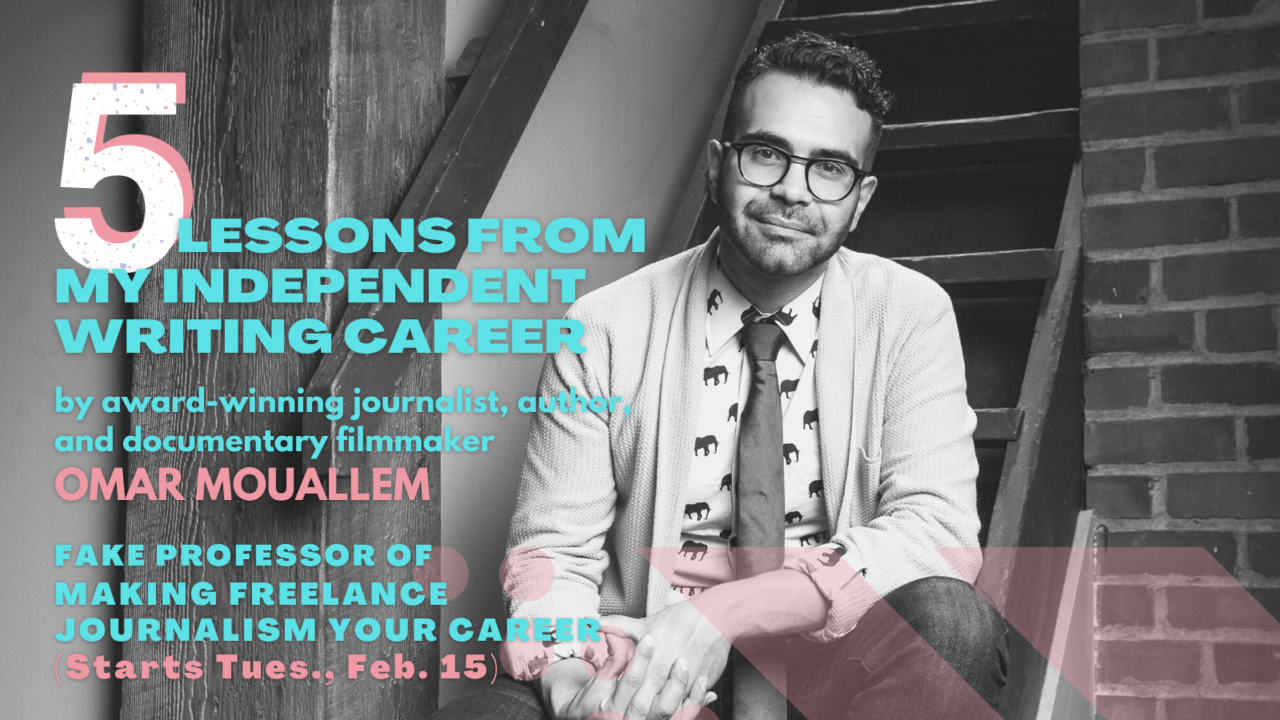Omar Mouallem is an author, journalist, filmmaker, magazine editor, and educator. He’s freelanced for over 100 outlets, including The Guardian, WIRED, and NewYorker.com; appeared on Al Jazeera, WNYC, and other networks; and received three National Magazine Awards and other honours.
Starting Tues., Feb. 15th, he’ll teach the seven-week course Making Freelance Journalism Your Career. Capacity is limited to 16 writers.
Click here to register or view the course outline. If you have any questions or are unsure if it’s for you, email Omar directly at info@pandemicuniversity.com.
1. You Don’t Need a Journalism Degree — or Any Degree
I learned journalism on the job. I was a film student in 2005, when I landed my first pitches — musician interviews and album reviews — with alternative magazines. No, I wasn’t paid — but I was informally mentored by editors who guided me through basic practices, from pitching to fact-checking. I loved freelance writing so much that after finishing my film diploma I enrolled in a degreed writing program. But I dropped out after a year because I wasn’t struggling to get published so long as I pitchedoften. I leveraged early clippings to get paid work, then better paying work, then top-dollar. All told, it only took me five years to go from unpaid writer to full-time writer. I have no degree to show for it, just a C.V. that runs a mile long.
2. Narrative Relies on Strong Imagery and Scenes
Since then, I’ve carved a niche as a narrative journalist known for long-form features that, at times, read like fiction. That’s because I learned the fundamentals of narrative through my screenwriting and film production education, which emphasized meaningful visual details (instead of irrelevant “colour”) and strong dialogue (instead of quoting). The cardinal rule in writing is “show don’t tell,” and nowhere is this truer than in film, where artists must find ways of presenting information to the ears and eyes. Scripts are stripped down to short, declarative sentences and just the necessary dialogue to move a story along.
3. Other Freelancers are Your Peers, Not Competition
On the surface it seems true that you’re competing with other freelancers — after all, there’s only so much work to go around, and what’s assigned to my counterpart could have been assigned to me. But that kind of thinking is toxic and could actually cost you. Good freelancer etiquette means supporting each other in various ways: bouncing ideas back and forth, reading each other’s pitches, sharing knowledge of good and bad practices, and most of all paying forward work that you can’t take on yourself.
I do this constantly — whenever I’m offered a job I can’t take, I recommend a few freelancers I respect and care about. The same is done for me. In fact, my first major book Inside the Inferno: A Firefighter’s Story of the Brotherhood that Saved Fort McMurray came out of such a recommendation. (Thanks, Jason!)
I’ve been able to sustain a 15-year career now as a storyteller because I observed and absorbed my parents’ immigrant grit. Think about how to cultivate curiosity and grit for yourself.
4. Hustle and Curiosity are Mandatory Qualities
There’s a lot that I can teach a writer — from crafting great pitches to getting the most out of interviews — but I can’t teach work ethic and curiosity. Yet, these are the two single-most essential qualities. If you’re not a naturally curious person, how can you recognize what’s a story worth telling or not? How can you generate enough ideas to sustain a decent writing career?
As for work ethic, any artistic career requires a lot of hustle to make a life of it. I feel genuinely grateful to have grown up in a working-class immigrant community. Watching my parents and relatives sweat it out to one day own their businesses taught me the value of persistence and resilience. I’ve been able to sustain a 15-year career now as a storyteller because I observed and absorbed their immigrant grit. Think about how to cultivate curiosity and grit for yourself.
5. You Need an Organizing System
Natural writers have an invisible antenna tuned for intriguing stories, but we also tend to be disorganized, storing those in phone notes and stickies we barely remember. When I made the leap into full-time freelance writing ten years ago, I organized my story ideas in a spreadsheet that doubled as a business plan. Looking back at it now, this spreadsheet was essential for longevity. It helped me get organized and stay organized. But it also kept me optimistic and forward looking when the inevitable rejections arrived (or didn’t). I still use it today. It runs nearly 200 ideas long, and the vast majority of the ones I pitched sold somewhere eventually.
Feel free to download my “pitch bank” template for yourself.
Award-winning journalist Omar Mouallem will teach you how to pitch the right story to the right market at the right time. Students will learn about:
- Alternative media markets and creative story frameworks
- Generating new ideas, organize them, and sell them a few different ways
- Write and workshop three queries to pitch afterwards
- Pitching techniques for various journalism styles and markets
- Researching and interviewing skills
- Getting the most out of your online presence
- Sensitive issues around copyright, payment, and common disputes
- Available apps and other tech to make the freelance life easier
COURSE SCHEDULE: Tuesdays, February 15 – March 29, 2022, 4pm–6:30pm PT / 7pm–9:30pm ET
CAPACITY: 16 students (6 spots remaining)
RECOMMENDED PREREQUISITE: This course was designed for writers with a minimum basic understanding of journalism principles and techniques. Not sure it’s for you? Feel free to reach out and ask the instructor directly: info@pandemicuniversity.com.

